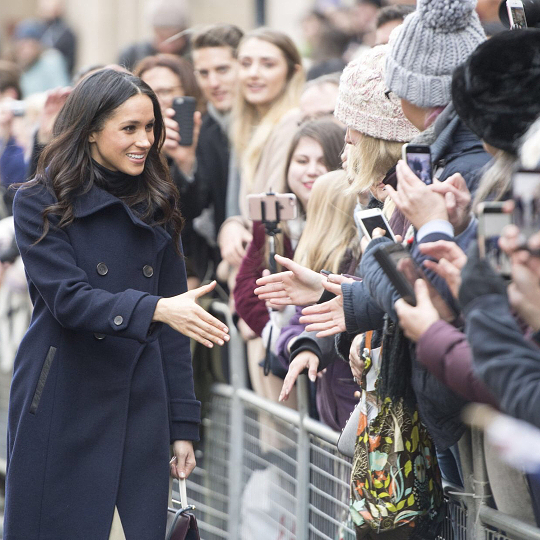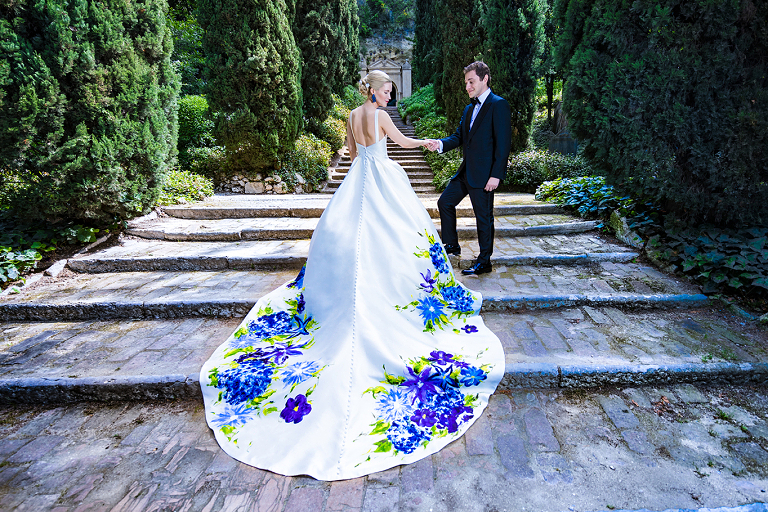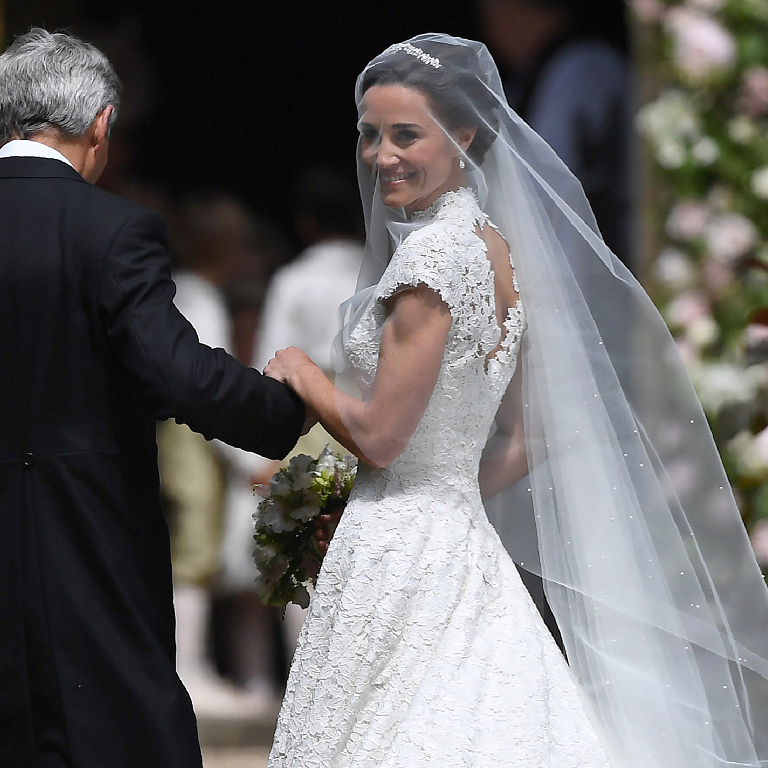
Truth be told, engagement announcements often give me anxiety. Nothing crazy, just a little tightness in the chest and a momentary bout of self-doubt. I’m in no way against weddings—in fact, I love them and am a fabulous guest—but as a single, independent woman in her mid-30s, I can’t help but take stock of my own personal life when news of such gravity is dropped. And yet, when BBC News sent a push notification through my phone at the break of dawn on Monday morning, with the official alert from Kensington Palace declaring that the Suits’ actress Meghan Markle was to marry Prince Harry, the redheaded reformed royal bad boy, who’s fifth in line to the British throne, I had no problem with taking this news personally.
I had in fact been waiting a year now for Prince Harry to make it official. Their relationship was objectively adorable, a coupling that seemed so of-the-times that it was hard not to champion them. She was an older divorcée, born to a black mother and a white father and raised in California. He, a royal who floundered for some time as a carousing playboy, but in his late twenties, after a tour in Afghanistan, began taking his military-career seriously along with his mental health. It wasn’t perfect nor what people were expecting, but it felt real. I figured if two opposites were going to collide, it had to mean something. As a black woman, my mind immediately jumped to the obvious: Not only was the British monarchy in for a shakeup, but the country was about to get its first black princess.
I know now that the pair’s official title is being quibbled over, but do you think that’s stopped me or other black women from weighing in on Markle’s cultural significance?! Hardly!
My timeline seemed to swell on Monday with the rallying call of “Black Girl Magic!” Memes of Meghan kept popping up in my Explore page, insisting that women shouldn’t settle; the Suits’ actress was proof! The 36-year-old divorcée has been referred to as the “real life Tiana,” Disney’s first and only black princess protagonist; my little three-year-old niece’s eyes sparkled when we relayed the news. This was not the stuff of make-believe, but IRL. The sizable outpouring of love from other black women made me consider the root of my own for Markle, which I realized was simple and yet profound: I loved seeing black women in the public eye unabashedly adored.
As I’ve previously stated, I’m no wedding person, but when R&B singer Ciara wed the dashing Seattle Seahawks quarterback Russell Wilson last summer in a castle in Scotland, I was rather emotional, just as I was from the outtakes from Serena Williams’s recent nuptials. There was something about seeing a black woman getting that fairy tale ending that tugged at my heartstrings. History has shown that women of color are rarely positioned as romantic protagonists within culture (please see the aforementioned Princess Tiana reference) and modern-day statistics would seem to suggest that our chances at marriage are even slimmer. As a black woman you don’t want to buy into tropes like these—they are so sizably influenced by sexism and racism. Which is why images that counter centuries-old prejudices are urgent and quite frankly, long overdue. There have to be other stories to tell to represent the world that we live in.
Now, conversely, plenty of media coverage and offline conversations have swirled this week challenging just how black Meghan Markle really is and whether as a biracial woman she could even be considered the first black princess. I’m not trying to parse out a person’s gene pool nor am I trying to ignore people’s concerns. Race is a messy construct designed to separate and conceal, rather than clarify. I simply understand, as we all hopefully do, that biracial identity is nuanced, and black identity is hardly myopic. It can look and be experienced in so many ways. I think Ms. Markle’s 2015 ELLE UK personal essay on the subject speaks to this sentiment. And while I haven’t of course spoken to the soon-to-be duchess about all of the apprehensions surrounding her racial makeup, I’ll simply say this: she’s certainly being treated like a black woman by the public and for that, I will claim her as the first black princess. How can we forget that after Daily Mail’s tone-deaf reporting of Markle’s family, with its offensive race-baiting headlines like “Harry’s Girl Is Almost Straight Outta Compton . . . ”, Prince Harry blasted the U.K. press in an official statement. It was an uncharacteristic but telling move from a historically buttoned-up monarchy. A thwarting of racism in a rather necessary and chivalrous way (c’mon, it’s pretty sexy), it also spoke to what lies ahead for Meghan. She’ll be up against odds that her future sister-in-law Kate Middleton, her closest royal counterpart, will never know, and attacks that black women across the globe know all too well. Amongst the black community we know this subtle inequity as the “black tax,” wherein POC have to work twice as hard as our white peers to succeed. Which is to say, Ms. Markle will most likely become one of the most followed, revered, and scrutinized women of our times.
I don’t think it’s hyperbolic to suggest her iconicity is all but ensured. She was 2016’s most Googled Female Celebrity, beating out the usual suspects: Oprah, Beyonce, Taylor Swift, Hillary Clinton, and Angelina Jolie. And, she hasn’t even said “I do”—imagine the coverage that will come once she officially joins the firm. In my estimate, I think she has the potential to be a Michelle Obama-like figure to a 21st-century England. Using her incredible platform, Markle’s passions could become the concerns of her newly-adopted country. She’s a life-long, self-declared feminist, who since 2014 has been an outspoken UN Advocate for international women’s rights. As former First Lady Michelle Obama brought awareness to child obesity, military veterans’ families, and international women’s education, Ms. Markle has the potential to put gender inequality front and center. If she’s as spirited and an inspiring a speaker as she was at the 2015 U.N. Women’s Gender Conference, I believe Ms. Markle can rouse and uplift spirits, her words instantly becoming endearing sound bytes like Mrs. Obama’s (“When they go low . . . ”).
But even if she chooses to be less vocal in her politics, Ms. Markle can always express her views through her clothing. Taking a card from the former first lady, who as we know wrote the book on how fashion as a political tool can sway audiences with her style choices. After all, that white Line The Label trench she wore to announce her engagement on Monday is now sold out. It’s just a preview of Markle’s star power and influence, which like Mrs. Obama’s, soon outshone her husband’s.
Only time will tell, but it’s safe to say that her significance has already been felt.












